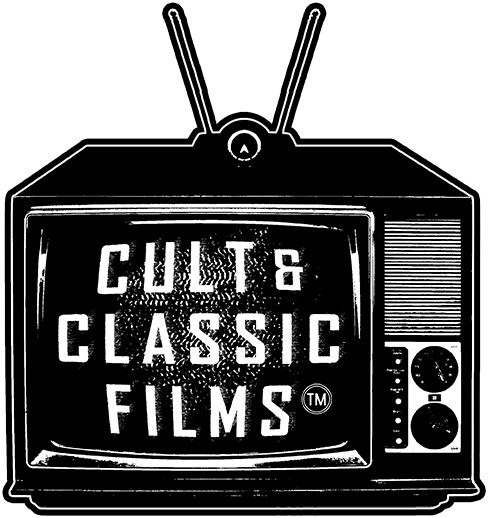EP 215: VIDEODROME (1983) vs. TERRORVISION (1986) - Revisited!
This week, we revisit a favorite episode that warns us to “Turn off that idiot box!”
We match DAVID CRONENBERG's body-horror hit VIDEODROME (1983) with TED NICOLAOU's satirical sci-fi horror flick TERRORVISION (1986)! Get ready for gruesome effects and drooling beasts, and don't sit so close to the screen!
"Turn off that idiot box!" is the name of the game on this episode of CULT AND CLASSIC FILMS Podcast!
Listen: Wherever you get your podcasts & at cultandclassicfilms.com/
Watch: youtube.com/@CULTANDCLASSICFILMS/
Subscribe at patreon.com/cultandclassicfilms for EXCLUSIVE cult movies sent to you every month!
Buy exclusive films at cultandclassicfilms.com/
Host: Nate Wyckoff
Panelists: Tad Mastroianni, Amanda Longley, & Greg Johnson
More on VIDEODROME (1983):
"Videodrome," released in 1983, is a thought-provoking and unsettling film directed by the renowned Canadian filmmaker David Cronenberg. This avant-garde masterpiece delves into the dark corners of media consumption, exploring themes of technology, reality distortion, and the unsettling human desire for illicit thrills.
The story revolves around Max Renn (James Woods), the president of a small cable television station in Toronto. Max is constantly searching for provocative and boundary-pushing content to broadcast on his network, driven by a relentless pursuit of audience numbers.
One day, Max stumbles upon a mysterious and sinister pirate television broadcast known as "Videodrome." Its extreme, sadistic content fascinates him, making him yearn for more. Driven by his obsession, Max becomes actively engaged in unraveling the mysteries behind the show. As Max plunges deeper into the realm of Videodrome, he discovers that it is more than just a sinister television program. It represents a gateway into a reality-altering experience that ultimately leads to physical and psychological transformation. The line between the virtual world and reality starts to blur for Max, resulting in a disturbing descent into a nightmarish world.
Along the way, Max finds a mysterious woman, Nicki Brand (Deborah Harry), who is also drawn to the dark allure of Videodrome. Together, they embark on a twisted journey exploring the depths of human fascination with violent media and the consequences it has on the human psyche.
Cronenberg's visionary direction skillfully blends elements of body horror, eroticism, and psychological thriller, creating an unsettling atmosphere throughout the film. "Videodrome" delves into themes of media manipulation, consumerism, and the potential dangers of technological advancement, painting a dystopian world that still has relevance today. Through its surreal imagery and disorienting narrative, "Videodrome" poses unsettling questions about the morality of media consumption and the potential consequences of indulging in extreme content. As Max's mind unravels, the film challenges viewers to question their own relationship with technology, media, and their thirst for provocative content.
With strong performances, particularly by James Woods, "Videodrome" stands as a landmark in Cronenberg's filmography. It remains a cult classic, appreciated by those seeking a cerebral and visually striking cinematic experience that pushes the boundaries of conventional storytelling.
Overall, "Videodrome" skillfully weaves together themes of reality distortion, societal obsession, and the psychological impact of media, leaving audiences questioning their own perception of truth and their relationship with the screen that dominates their lives. This thought-provoking film continues to captivate viewers and cement Cronenberg's reputation as one of the most daring and visionary filmmakers in cinematic history.
More on TERRORVISION (1986):
In 1986, TerrorVision emerged as a surreal and eccentric science-fiction horror-comedy directed by Ted Nicolaou. This bizarre cult classic combines elements of 1950s creature features, satirical commentary, and an over-the-top fusion of visuals and humor. The film revolves around the Putterman family, an eccentric and dysfunctional suburban clan residing in a technologically advanced household. When their new satellite dish is accidentally hooked up to a malfunctioning alien transmission system, chaos ensues.
Young Sherman Putterman inadvertently becomes the receiver for extraterrestrial life from the planet Pluton. This alien entity, aptly named Pluthar, is a hulking and grotesque creature that materializes in the Putterman's television set. As the rest of the family remains blissfully unaware, Sherman forms a peculiar bond with the grotesque alien. As Pluthar seeks sustenance, he devours everything in sight, turning each victim into a globular dessert. Eager to satiate his hunger, he wreaks havoc on the household, terrorizing its members, and creating a macabre circus.
Yet, behind the monster's murderous rampage lies a satirical critique of contemporary culture. TerrorVision satirizes the excessive consumption of the 1980s, parodying the mindless voyeurism propagated by television, including reality shows, infomercials, and sensationalist programming. The film's absurdity is conveyed through exaggerated performances and colorful, kitschy production design, capturing the gaudiness and superficiality of the era.
Ted Nicolaou deliberately juxtaposes the absurd with the mundane, showcasing the chaotic clash between the Putterman family's suburban existence and the extraterrestrial invasion within their home. As they initially mistake the alien's grotesque appearances as avant-garde art, the film highlights the shallow sophistication and naivety often found within wealthy suburban communities. Among the standout performances, Gerrit Graham shines as Stanley Putterman, the comically obnoxious father figure. His charismatic portrayal captures the essence of a clueless, self-absorbed patriarch whose arrogance amplifies the film's satirical undertones.
TerrorVision stands out for its unique visual style, retro fashion, and an unabashedly campy tone. The bizarre practical effects and grotesque monster designs add to the film's offbeat charm, reminiscent of classic B-movies.
While TerrorVision may not be for everyone, its blend of humor, social commentary, and imaginative creativity has garnered a devout cult following over the years. Despite its initial lackluster reception, the film has cemented its status as a beloved oddity, embodying the spirit of 1980s cult cinema.
So, if you're intrigued by films that dare to bend traditional genre boundaries and offer a satirical take on the excesses of pop culture, TerrorVision is a retro delight that will transport you to an absurd universe of intergalactic chaos and suburban calamity. Prepare for a ride that is equal parts enticing, baffling, and unforgettable.
#cultmovies #cultfilm #videodrome #davidcronenberg #tednicolaou #terrorvision #debbieharry #jameswoods #cultandclassicfilms #horror #movies
